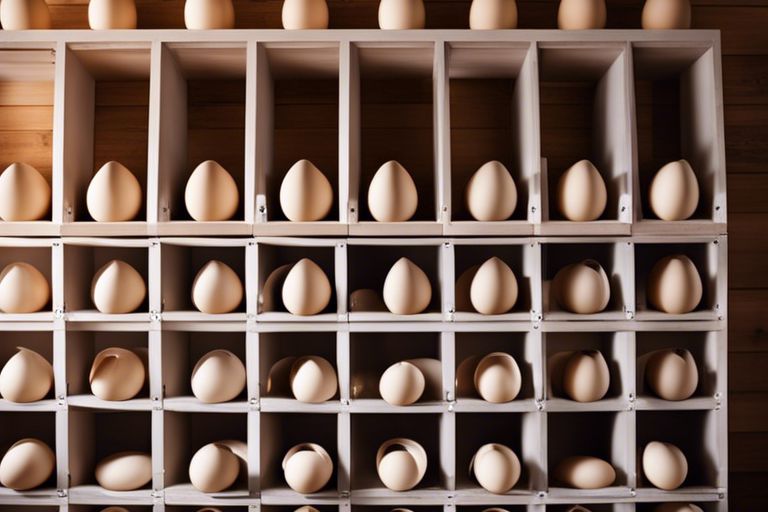Egg Collection Made Easy – Organizing Your Nesting Boxes
Most poultry owners know the importance of a well-organized nesting box setup for efficient egg collection. Keeping your nesting boxes clean, easily accessible, and properly labeled can streamline the egg gathering process, saving you time and ensuring the eggs are collected promptly. In this blog post, we will discuss practical tips and strategies to help you set up and maintain a functional nesting box system on your poultry farm or homestead.
Understanding Nesting Box Fundamentals
A successful egg collection process begins with a solid understanding of nesting box fundamentals. These boxes play a crucial role in ensuring that your hens have a comfortable and safe space to lay their eggs. By organizing your nesting boxes effectively, you can streamline the egg collection process and ensure that eggs are kept clean and undamaged.
The Role of Nesting Boxes in Egg Collection
With proper nesting boxes, hens are provided with a secluded and secure area where they can lay their eggs. This helps to reduce the chances of eggs being laid in undesirable locations, such as in the coop bedding or outdoors. Nesting boxes also provide a clean and comfortable environment for hens to lay their eggs, which can help to improve the overall quality of the eggs.
Optimal Placement for Accessibility and Comfort
The placement of nesting boxes is crucial for ensuring accessibility and comfort for your hens. Boxes should be located in a quiet and dimly lit area of the coop, away from high-traffic areas. Placing the boxes at a height off the ground can help to prevent egg-eating behavior in your hens. Additionally, providing ample bedding material in the boxes can make them more inviting for your hens to use.
With proper placement and design, nesting boxes can become a favorite spot for your hens to lay their eggs. By understanding the fundamentals of nesting boxes and their role in egg collection, you can set up a system that makes egg collection easy and efficient for both you and your hens.
Nesting Box Design and Organization
Obviously, a key aspect of successful egg collection is having well-designed and organized nesting boxes. Proper nesting boxes provide a comfortable and inviting space for your hens to lay their eggs, making it easier for you to collect them efficiently. Here are some tips to help you create the ideal nesting box setup for your flock.
Choosing the Right Materials for Your Nesting Boxes
Your choice of materials for the nesting boxes is crucial. Opt for easy-to-clean, durable, and non-toxic materials such as wood or plastic. Make sure the boxes are of the right size to comfortably accommodate your hens and provide a sense of security and privacy for them to lay their eggs.
Consider adding soft bedding materials like straw or wood shavings to the nesting boxes to create a cozy environment for your hens. This not only helps keep the eggs clean but also prevents them from cracking.
Effective Organization Strategies for Multiple Hens
Materials such as dividers or curtains can be used to create separate compartments within the nesting boxes, allowing multiple hens to lay eggs simultaneously without disturbing each other. This helps maintain a sense of order and reduces the chances of egg breakage.
Nesting boxes should be arranged in a quiet and secluded area of the coop to provide a calm and peaceful environment for your hens to lay their eggs. Implementing a routine for egg collection and keeping the nesting boxes clean and well-maintained are also essential for efficient organization.
Maintenance for Maximum Efficiency
If you want to ensure your egg collection process runs smoothly and efficiently, regular maintenance of your nesting boxes is key. By implementing a few simple daily tasks and scheduling periodic check-ups, you can keep your eggs clean, your hens happy, and your overall operation running like a well-oiled machine.
Daily Collection Tips to Keep Eggs Clean
If you collect eggs daily, you can help keep them clean and minimize the risk of breakage. Make sure to gather eggs at the same time each day to establish a routine for your hens. Inspect each egg as you pick it up to ensure it is clean and free of cracks. Wipe off any soiled eggs with a dry cloth or gently wash them with warm water if necessary. Remember to always wash your hands before and after handling eggs to prevent any contamination.
- Collect eggs at the same time each day to establish a routine for your hens.
- Inspect each egg for cleanliness and cracks before placing them in your egg carton.
- Wipe off any soiled eggs with a dry cloth or wash gently with warm water if needed.
Any dirty bedding or nesting material should be replaced regularly to maintain a clean environment for your hens and their eggs. By keeping your nesting boxes clean and dry, you can reduce the risk of bacteria growth and ensure the quality of your eggs remains high.
Scheduling Regular Nesting Box Check-ups
An essential part of maintaining efficient egg collection is scheduling regular check-ups of your nesting boxes. By inspecting the condition of your boxes on a weekly or bi-weekly basis, you can identify any issues such as wear and tear, damage, or the need for additional bedding. This proactive approach can help prevent potential problems that may arise and ensure that your nesting boxes are in optimal condition for your hens.
With regular check-ups, you can also monitor the laying habits of your hens and address any abnormalities or concerns promptly. By observing the behavior of your flock and the condition of the nesting boxes, you can make any necessary adjustments to promote a healthy and productive laying environment.
Advanced Techniques and Tips
Not every egg collection method is created equal. To truly optimize your egg collection process, consider the following advanced techniques and tips:
- Establish a schedule: Consistency is key when it comes to egg collection. Set a specific time each day to collect eggs to ensure you don’t miss any.
- Implement nesting box curtains: Curtains can provide a sense of privacy and security for your hens, encouraging them to lay eggs in the nesting boxes.
- Rotate bedding regularly: Dirty bedding can deter hens from laying eggs in the nesting boxes. Make sure to clean and rotate the bedding frequently.
- Label eggs with collection date: By labeling eggs with the date they were collected, you can easily track freshness and rotation for optimal consumption.
Utilizing Technology for Easier Egg Collection
Advanced technology has made egg collection easier than ever before. By incorporating tech-savvy tools into your egg collection routine, you can streamline the process and increase efficiency. Consider investing in automatic egg collection systems that can collect eggs on your behalf, or using smart sensors to monitor egg production levels in real-time. These technological advancements can revolutionize the way you manage your nesting boxes and ensure a successful egg collection process.
Another helpful tech tool for egg collection is the use of surveillance cameras in the coop. By setting up cameras, you can remotely monitor nesting box activity, ensuring eggs are being laid where they should be. This not only saves you time and energy but also provides peace of mind knowing that your egg-laying hens are happy and productive.
Troubleshooting Common Nesting Box Issues
To address common nesting box issues, it’s important to identify the root cause of the problem. By understanding why hens may be avoiding the nesting boxes or experiencing difficulty laying eggs, you can implement effective solutions to improve the situation.
To wrap up
Hence, with these tips on organizing your nesting boxes, you can ensure a smoother and more efficient egg collection process. By keeping your boxes clean, properly labeled, and regularly checked, you can create a conducive environment for your hens to lay eggs and for you to easily collect them. Be mindful of, a well-organized nesting area not only benefits you but also helps keep your flock healthy and productive. So, take these strategies to heart and enjoy the benefits of a well-maintained egg collection routine.



